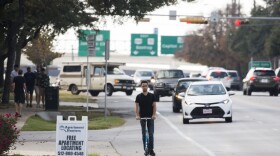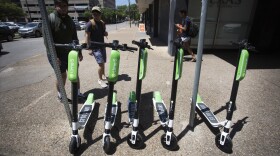Another dockless scooter company plans to enter the market in Austin – but its users will get to sit down.
OjO Electric, LLC, a California-based company, is launching the first sit-down electric scooter rideshare in the capital. One hundred scooters are expected to hit city streets by Feb. 1 and grow to 250 later in the spring.
OjO says unlike other scooter companies operating in the city, it's trying to be more deliberate.
“We’ve had the opportunity to see [other companies] ‘disrupt,’ and we don’t want to ‘disrupt,’” said Matt Tolan, OjO's vice president of partnership and fleet sales. “Our philosophy is to go into a city, like we’ve done in Austin, and collaborate with key stakeholders.”
OjO has partnered with Austin Commuter Scooter – a subsidiary of Bike Share of Austin, which operates B-Cycle – to help launch and manage the new scooters.
“We’re just thrilled to be partnering with them and be the first city in the world ... to have a seated scooter in the rideshare space,” said Elliott McFadden, executive director of Bike Share of Austin.
The estimated 60-pound scooters will go up to 20 mph, the maximum allowed by the city. They will include a Bluetooth speaker, navigation alerts and geofencing to regulate speeds in certain areas.
The scooters will cost $1.25 to rent and then 18 cents a minute.
The company says it will be pushing rider education and strongly encouraging customers to avoid sidewalks while on the devices.
“It’s built for the streets, not for the sidewalks,” Tolan said.
He said the sit-down scooters increase accessibility for users who can’t ride the standing scooters in Austin.
“I think sometimes people see the scooters and think of it as a younger mobile transportation alternative, but we believe with our scooters and our seats we’re catering to a wider swath of people," he said.
McFadden said the scooters can be parked near B-Cycle docks, as well as anywhere else electric dockless scooters are allowed. Scooters blocking sidewalks and ramps have been one of the common complaints of the dockless devices, which popped onto Austin’s walkways last spring.
McFaddon said the company will employ full-time workers who are paid a living wage.
“It’s not going to be contractors who are looking to make an extra 5 or 10 bucks on the weekends," he said. "We’re going to bring a professionalism that I think is missing in the market.”
Austin Commuter Scooter will provide a 24/7 customer service, conduct research and help choose the best areas to place scooters.
“We’re not just going to dump 1,000 scooters into the street,” McFadden said. “We’re going to ramp up over time and understand the usage and collaborate with the city based upon the permitting requirements.”







